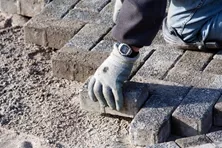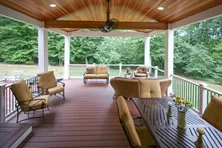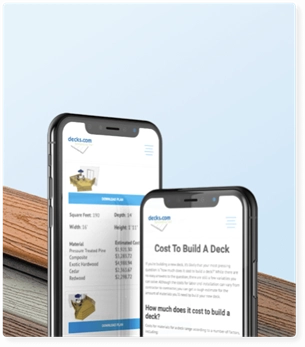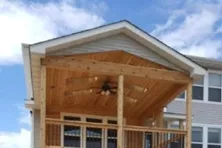How to Find & Choose a Deck Contractor
How to Find a Reliable Deck Contractor
The best place to start your search for a deck contractor is online or a referral from a friend. Decks.com uses past customers' experiences to publicly rate contractors across the U.S. Most established deck contractors now have their own websites offering an overview of their qualifications and pictures of their work. This will give you a chance to evaluate their abilities before you give them a call.
Home Shows can be an excellent one-stop resource for making face-to-face contacts and collecting information from a number of contractors. It is a good idea to interview a minimum of three different deck contractors for any project you may be considering.
Deck construction has changed relatively dramatically from what it was a decade ago when few construction standards existed for decks. New product technologies coupled with an explosion of the outdoor living lifestyle has moved decks into a niche industry. In looking to hire for your new deck, we strongly encourage a deck-specific tradesman or business. A general contractor or carpenter, that does not specialize in deck construction, is likely behind the times and will not be able to offer you the full variety of the product market. They are also more likely to be unpleasantly surprised by new building code requirements unique to deck construction.
A huge benefit to hiring a professional is granting someone else the trust to get the job done timely and correctly. However, there is certainly some value in doing a little homework as to what you should expect from the professional. Here are the types of questions you should ask your contractor during the hiring process.
Learn how to find and hire the right deck builder for your project in our guide below.
Table of Contents
- How to Find & Vet a Deck Contractor
- What to Consider When Hiring a Deck Contractor
- What to Do When Something Goes Wrong
What to Look for in a Deck Contractor
Credentials & Requirements
First and foremost, verify the contractor has all the legal requirements in your region to perform construction services. If licensing and bonding is required, expect them to have it.
Always verify they have general liability insurance, or don’t be surprised when your homeowner’s insurance ends up paying a claim. Make certain that any contractor you consider hiring has a license for the work they are performing, liability insurance and workman’s compensation insurance. These are vital prerequisites for protecting yourself from any serious liability in the unfortunate case of an accident.
Always verify they have general liability insurance, or don’t be surprised when your homeowner’s insurance ends up paying a claim. Make certain that any contractor you consider hiring has a license for the work they are performing, liability insurance and workman’s compensation insurance. These are vital prerequisites for protecting yourself from any serious liability in the unfortunate case of an accident.
A contractor must maintain liability insurance and workman’s compensation insurance to ensure you don’t get stuck with the bill if your house gets damaged, or end up in court if someone falls off a ladder and gets hurt. These types of insurance are very important as they will protect you from assuming liability if your home is damaged or a worker is injured during your project.
Your contractor will be required to obtain a building permit and pass all necessary inspections to verify compliance with IRC codes and assume the responsibility for having utility lines located before excavating frost footings.
All legitimate contractors will be aware of the local laws and regulations and should be more than willing to put your concerns to ease. Most contractors advertise using their license number to eliminate any questions. These items should be clearly listed on the contract to provide you with a record of their credentials.
Experience
Most deck contractors are very capable of building a sturdy and attractive deck. However, some are definitely more skilled at designing a deck than others.
Deck design can be quite complicated. Each individual approaches design from a different background and using his or her own methods and techniques. A good design begins with a trip to the site and an interview with you to establish your needs and wants. Try to keep an open mind to their ideas and give them your full attention. Nowadays, contractors may use drone technology or photos from your mobile device to scope out the area instead of an on-site visit.
Once the contractor presents you with a deck design, it is your job to ask yourself a few simple questions. Does the design make sense to you? Will it meet your needs and expectations? How does it compare to your other designs? Having a couple of competing designs to compare should help make your decision easier. You will want to be completely comfortable with the design before moving forward. Bring up any concerns now. Making changes at a later date can mean added costs, delay to the project’s scheduling and can otherwise complicate matters.
References
Building a deck involves a substantial monetary investment. It can often be as expensive as buying a new or used car. You never want to buy a lemon. You should approach these major purchases with the same amount of caution and attention to detail. Don’t be afraid to, if possible, test drive some decks before making your final decision on a contractor.
Ask for some references in your area. Take a couple of hours out of your weekend to visit a few of their past customers. This will allow you to gain first-hand information of how things went and see what the final product looks like. Inspect the details of their craftsmanship. Find out when the deck was built and see how well it has held up with time. Ask if there were any problems dealing with the contractor, especially, how easy it was to communicate with them and if the project finished on time and on budget. You may also want to ask your contractors if they are listed as preferred contractors on Decks.com. These valuable sites offer published documentation of the level of customer satisfaction on their previous projects.
Range of Offerings
Some deck contractors specialize in designing and building with a specific material such as composite. Others are much more versatile and offer a diverse range of choices. Unless you already know exactly what you want, it can be very helpful to have a variety of options.
Each material offers a set of unique characteristics to a project. Some are advantageous, others are problematic. A good contractor will be able to explain the differences and share his knowledge to assist you in making an educated decision. Look for contractors that offer a variety of extras like low voltage lights, custom planters and benches that can help set your deck apart from the crowd. Trying something different can make your deck special. Most contractors are always up for a challenge in order to make a deck interesting. However, going outside a contractor’s comfort zone, such as selecting a material that is unfamiliar to them, will likely increase the cost of the project.
Organization
Who exactly are you dealing with and what is their relationship with the company? Companies are organized in different ways. You will want to know if you are talking to a salesperson, the owner of the company or the guys who will actually be building the deck. Each position offers a unique perspective on how they deal with customers. It will be important that you are able to maintain responsive communication with this person throughout the different phases of the project. You will want to find out the name and phone number of the lead carpenter assigned to your project. Also, you will want to know if your project will be subcontracted out to another builder. Subcontracting is not necessarily a bad practice as it can speed up production, but it can result in employing less-trained carpenters and increase the risk of miscommunication. Most deck building companies are relatively small, the more you know about how the company is organized, the easier it will be for you to effectively communicate with the right people throughout your project.
Integrity
Most deck contractors are good hardworking people trying to make an honest buck. You can never be 100% sure of the character of a stranger, but a little homework on your part can reduce the chance of putting yourself at risk. Trust your intuition. What is your impression of them? Do you think they will be good people to work with? If you sense they are not being honest with you or are trying to hide something, you should consider looking elsewhere. If someone has an established business in your community, it should be easy to check out their references. Examine the contract carefully for any information that is missing or that seems odd or out of place. You want to make sure that they will honor their promises and stand behind their work. It shouldn’t be a scary experience to hire a contractor, most people are very happy with the outcomes of their projects, but it can never hurt to be cautious when working with people that you don’t know.
What to Consider When Hiring a Deck Contractor
Establish the Homeowner’s Responsibilities
Your responsibilities as the homeowner and customer will be laid out straightforwardly in your deck builder’s contract. Examples include:
- Maintain homeowners insurance
- Attain approval on design from HOA, where appropriate
- Communicate with neighbors that construction will take place during specific dates and times
- Provide power for contractors tools (or be charged additionally for the use of generators)
- Provide storage space for building materials
- Relocate sprinklers and/or cable television lines, if applicable
- Pay full amount on time
Your homeowner’s insurance policy is necessary to recover any costs of damage caused to your property or to replace materials that are damaged or stolen from the site.
Other responsibilities will include making appropriate arrangements to accommodate the construction process. If you need to do anything to prepare the site for construction, like removing a concrete patio, you may need to do this before construction can begin.
In some cases, you may be asked to allow access to bathrooms. Any other requests should be clearly understood and arranged for.
Verify if a Permit is Required
You’ll need to call the local building authority and verify if a permit is required for your project. It’s in your best interest prior to meeting with any contractor to understand if permits are required where you live. We strongly recommend that the contractor finally choose files for the appropriate permits.
Building permits and inspections are indeed a time consuming process and often not favored by contractors. Given opportunity, many of them would forego the process. This is not acceptable, and you should make it your responsibility to know when one is required and expect your contractor to abide. Work completed without a permit notoriously bites the owner years down the road.
Discuss Start and Completion Dates
It should come as no surprise that deck building is an extremely seasonal industry. In the spring and summer months, there is always a high volume of work to keep deck contractors busy. This creates a situation where homeowners will have to wait in line for their project to start.
Planning your schedule around construction can be inconvenient. How soon can your contractor start? When will they finish? Will there be a discount or a back out clause in the case of a significant delay? A legal contract for a deck requires a stated start and finish date.
Your contractor will agree to complete the project in a professional manner for the agreed upon price and within the stated time frame. Any legal deck contract must set specific dates for the project to start and finish. This date will be given to you by the contractor to fit into the company’s schedule and should represent a realistic time frame for your project. You may want to ask if there is a penalty for delays.
In construction, the weather and other unforeseen conditions can often slow down a contractor’s schedule. You will want to find out what will happen if the project is significantly delayed. Will you be given a discount or be able to back out of the contract without a penalty? If you need your deck by a specific date, like a graduation party, this may be a crucial detail for your agreement.
Construction is an imperfect science. You must try to be patient and cooperate with your deck contractor, but it is ultimately their professional responsibility to provide you with a realistic time frame for your project. You will want to try to be understanding and patient, but the stated dates are listed on the contract for good reason. It is ultimately the contractor’s responsibility to ensure your deck finishes on time. Your contract will offer you some assurance that your deck will be built in a timely manner.
Determine Payment Methods & Schedules
Homeowners should establish the total amount, including sales tax, that is being agreed upon to pay for the work to be completed. Some contracts break the total amount into smaller progressive payments to be made at specific times during the project. This system usually works well in translating the proportion of work completed to payments applied. You can ask your contractor about they’re preferred payment schedule.
The balance of the payments you are holding will provide the incentive for the contractor to fulfill their contractual obligations. In some cases, a third party may be introduced to hold the money in escrow pending the fulfillment of the contract.
Define the Scope of Work & Project Specifications
This section will clearly outline the exact nature of the work your contractor is going to do for you. The more specific you make the details, the better. You will want it to include a scale drawing complete with dimensions to define the size and shape of the deck being built. This must be very accurate. Include the number of total square feet, the elevation, the direction of decking and any other essential information.
You will also need to establish the specific materials that are going to be used. Leave nothing to interpretation. Make sure the type, size, color, style, grade, name brand, etc. are listed to guarantee you get exactly what you are expecting and paying for. Your contractor will also need this document to refresh their memory when it comes time to ordering materials. This written information vastly outweighs any verbal agreement of what is going to be done. Make sure it is accurate, clearly written and leaves nothing out.
Agree on Terms and Conditions
This section will represent a collection of resolutions to common disputes that the contractor feels the need to be mutually established. Many of these conditions come from the contractor’s experience in dealing with past customers and could be considered common sense. In this way, contracts are designed to spell out as many potential issues as possible. It will probably be stated that the contractor is not responsible for any yard damage that may occur during construction. There may be a line that discourages change orders, requiring an added cost and requiring that they be expressed in writing. Every contractor will want to cover their bases and protect themselves from unrealistic expectations. You should review each item, but do not be intimidated by them. These terms and conditions usually cover worst case scenarios and help contractors deal with difficult customers. In practice, a detailed terms and conditions section usually suggests that a lot of thought has been dedicated to details and making sure your project goes smoothly.
Finalize the Contract
When you hire a deck builder, what will guarantee that all goes according to plan? The answer is that you will possess a legal contract that can be used as proof of the agreement. If drafted properly, this piece of paper will validate your agreement as legitimate and binding under the laws of the land.
In most cases, this is as simple as evidence that one party makes an offer and the other accepts it. The contract will further act as a written explanation of the detailed responsibilities of both parties participating in the project. This leaves little to interpretation and should prevent most disputes from ever occurring. Both sides must understand and sign the document to execute the contract.
You will want to make sure that all the necessary information is included in one completed document. Using a collection of sketches and notes in place of a formal contract is disorganized and unprofessional. It can also be confusing, contradictory and ineffective.
What to Do When Something Goes Wrong
If something goes wrong during your project, we recommend staying calm and following the established chain of command. For instance, if the wrong color decking shows up at the job site, first talk to the construction crew to get it straightened out. Usually, this kind of problem is just a matter of miscommunication that can be easily resolved.
If a problem persists, you may need to talk to whoever drafted the contract or the owner of the company. Your contract should clearly specify what the exact terms of the project are. In rare circumstances, if the company refuses to offer a solution, you may need to pursue the matter with an outside party. Do not make idle threats. Use extreme caution and only use this action as a last resort, as you will likely stir up some bad feelings and things can turn ugly fast.
Learn more about hiring contractors in our Planning articles. You can also find nearby deck builders in using your location in our Find a Builder tool.
IRC Code Requirements For Decks
Residential properties have certain code requirements that must be met before building a deck known as the IRC. Learn more about IRC building codes for decks at Decks.com!
Questions To Ask Your Deck Contractor
The quest to find the right contractor to complete your decking project can feel overwhelming and stressful. Learn more about what questions you should ask before hiring a contractor on decks.com
Contractor Problems? How to Communicate with Contractors and Handle Disputes
When working on a large construction project, there are bound to be bumps in the road. Learn how to handle disputes with a contractor with Decks.com.
How to Build a Patio With Stone or Brick Pavers
Planning and installing a DIY brick or stone paver patio is a big project. Learn how to build a paver patio from start to finish here.
Front Porch Decor Ideas on a Budget
Want to decorate your porch to be welcoming but need to stay within a budget? Explore our budget-friendly ideas for decorating your porch at Decks.com.
How To Finish Your Porch
Add some finishing touches to give your porch a bit of style. Learn about covering your porch ceiling, railings, soffits, fascia and trim at Decks.com.
More Helpful Resources
Explore Articles by Topic

Footings
Information related to installing frost footings for decks
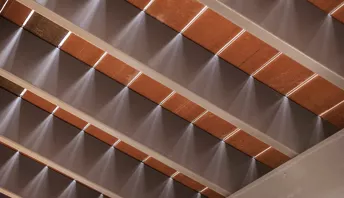
Framing
Learn structural framing methods
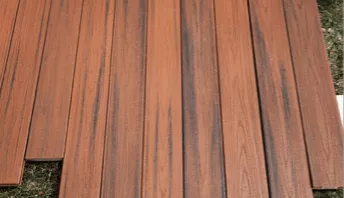
Decking
Learn about wood and composite decking materials
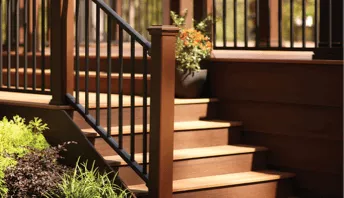
Stairs
An in-depth look at the complex issue of how to build stairs
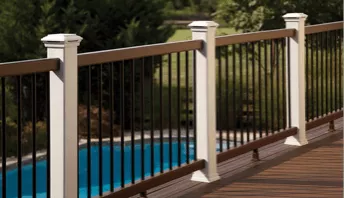
Railings
How to install guardrails and handrails to meet IRC code

Features
An overview on water drainage, benches, planters and lights

Design
The basics of deck design
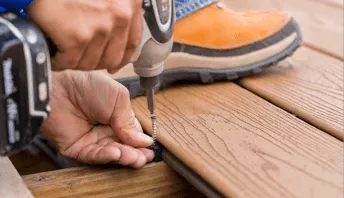
Planning
Learn about permits and working with contractors
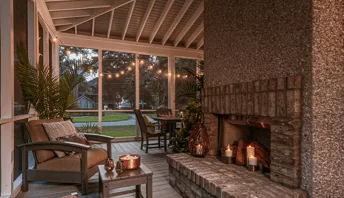
Porches & Patios
Build a covered deck to enjoy all seasons
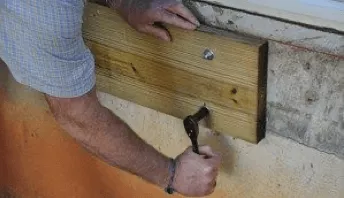
Ledger
Proper attachment techniques

Care
Maintain your deck to maintain your investment

Materials
An overview on water drainage, benches, planters and lights
How to Grade Your Yard
Master the art of yard grading! From choosing the right slope to understanding the costs, this guide covers everything you need to achieve a properly graded yard that protects your home and enhances your landscape.
Residential PSF Deck Requirements
For a residential deck, the code requires it be designed to support a minimum 40-psf live load. Learn more about how much to put on a deck psf at Decks.com.
IBC Requirements For Decks
The International Building Code (IBC) regulates deck additions attached to commercial buildings. Learn how IBC requirements may affect your project at Decks.com.
9 Conservatory Design Ideas for Indoor/Outdoor Living
Conservatories are a great way to ensure that you (and your plants) can soak up the sun all year round. Get inspired with conservatory design ideas.
Engineered & Premade Porch Roof Trusses
Using engineered porch roof trusses can take a lot of the hassle out of building your porch roof. Learn more about premade porch roof trusses at Decks.com!
Backyard Patio Ideas and Inspiration for 2025
Transform your outdoor living space with our 2024 backyard patio ideas. Discover an array of materials such as concrete, brick, flagstone, tiles, cut stone, and gravel, each offering unique benefits. Whether you prefer modern, rustic, or traditional styles, find the perfect patio solution to enhance your home's charm and functionality.
Explore Articles by Topic

Footings
Information related to installing frost footings for decks

Framing
Learn structural framing methods

Decking
Learn about wood and composite decking materials

Stairs
An in-depth look at the complex issue of how to build stairs

Railings
How to install guardrails and handrails to meet IRC code

Features
An overview on water drainage, benches, planters and lights

Design
The basics of deck design

Planning
Learn about permits and working with contractors

Porches & Patios
Build a covered deck to enjoy all seasons

Ledger
Proper attachment techniques

Care
Maintain your deck to maintain your investment

Materials
An overview on water drainage, benches, planters and lights





